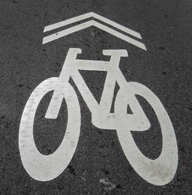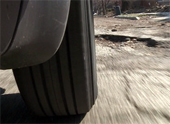Posts Tagged ‘lawyer’
Bike Month: Time for Massachusetts to Think About Safety
 This is National Bike Month, when cyclists gather for events and rides all over the country. In Massachusetts, the busiest time is during Bay State Bike Week, which began last weekend. Cyclists from Boston to Springfield to Cape Cod are being encouraged to pedal to and from work in the name of fitness and reducing traffic congestion on the roads.
This is National Bike Month, when cyclists gather for events and rides all over the country. In Massachusetts, the busiest time is during Bay State Bike Week, which began last weekend. Cyclists from Boston to Springfield to Cape Cod are being encouraged to pedal to and from work in the name of fitness and reducing traffic congestion on the roads.
But along with the fun, Bike Month is a time to ask ourselves and lawmakers if we can make the roads safer to prevent personal injury to bicyclists.
While Boston has been called a world-class cycling city in recent years, safety advocates say we can do better. This month, the League of American Bicyclists dropped the state’s ranking from third to sixth in its 2013 Bicycle Friendly State Rankings, offering these and other suggestions to state officials:
Safe Passing Law. Adopt a safe passing law with a minimum distance of three feet to address bicycle safety.
Vulnerable Road User. Adopt a vulnerable road user law that increases penalties for motorists that injuries or kill bicyclists or pedestrians.
Cell Phone Ban for Drivers. Pass a cell phone ban for all drivers. Currently, Massachusetts bans all drivers from texting while driving but only bans drivers under 18 from talking on their cell phones and driving.
Bicycle Riders Manual. Create a statewide bicycle riders manual with laws, state bike routes and laws for cyclists.
MassBike, the state’s leading advocacy group for cyclists, has been seeking passage of a vulnerable road users bill that increases penalties for drivers who injure or kill a bicyclist or others defined as a vulnerable road user. MassBike first filed a bill with the Massachusetts Legislature in 2011 and refiled a few months ago for the start of the new legislative session.
Under the bill, drivers found guilty of crimes such as motor vehicle homicide or hurting or killing a person while driving drunk would face double the normal fines if the victim is considered a vulnerable road user.
The bill defines vulnerable road users as “a pedestrian or a person operating a bicycle, handcycle, tricycle, skateboard, roller skates, in-line skates, wheelchair, non-motorized scooter or any non-motorized vehicle, or a person riding a horse.”
Additionally, the bill would require violators to take a traffic class and perform 100 hours of community service related to road safety. There would be special penalties for drivers who harass vulnerable users with their vehicles. Meanwhile, victims would be given guidelines for filing civil lawsuits against drivers who assault or threaten them.
Another bill proposed by MassBike is the Bicycle Lane Bill, which would make it a violation for a car to park or stand in a marked bike lane. Boston and some other communities have bans, but MassBike seeks a statewide ban.
Read about other bills filed and supported by MassBike.
Texting While Driving Study: Voice-to-Text is Not Safer

We all have one: a cell phone we keep close by throughout the day, to keep in touch with work and the people in our lives. Many of us now use smart phones so in addition to talking and texting, we have quick access to apps, cameras and other neat gadgets. The bottom line is we get more use from our mobile phones now than ever.
While the conveniences are nice, they are a negative when it comes to driving. Studies have long shown cell phone use of any type is a distraction which can result in drivers taking their eyes off the road and causing motor vehicle accidents.
Most states have some restriction on use. The District of Columbia and 39 states, including Massachusetts, ban texting while driving. Ten states and the District of Columbia ban all phone use by drivers. Massachusetts bans all cell phone use for drivers under 18.
Some say these efforts and related educational campaigns are falling short and the use of smart phones is actually increasing. The market has certainly grown dramatically. By last October, the count was over 1 billion smart phone users worldwide, according to one firm’s report. By 2015, another billion users are expected to get smart phones.
Many new users are using talk-to-text technology while they drive, but a new study finds this is not actually any safer. The study by the Texas A&M Transportation Institute was released during April’s National Distracted Driving Awareness Month. The study was the first to compare voice-to-text and manual texting.
The Study
The transportation institute studied 43 research participants driving a vehicle on a closed course. Drivers traveled the course without any cell phone use, then three more times performing texting exercises. On the first two laps, they used two different voice-to-text applications. On the third lap, they texted manually.
Researchers found driver response was significantly delayed when drivers used voice-to-text or sent text messages. In both cases, drivers took about twice as long to react as they did when they were not texting.
Manual texting required slightly less time than voice-to-text, but driver performance was roughly the same.
One theory for why is drivers who used voice-to-text had to look down at the phone after they spoke their message and check it before sending, taking their attention from the road.
Massachusetts Texting While Driving Law
The Massachusetts law which bans texting while driving is M.G.L. c. 90, Sec. 13B. It took effect Sept. 30, 2010.
Under the law, drivers in Massachusetts are banned from both texting and e-mailing while operating a car. They cannot read or browse the Internet. Voice-to-texting is not specifically addressed in the law.
Some police departments are seeking to enforce the law. In January, West Bridgewater police stopped 51 drivers over four hours on a Saturday afternoon. In March, another four-hour sting caught 43 drivers texting.
Texting while driving is a non-criminal offense which carries a $100 for the first offense, $250 for the second offense and $500 for the third.
Drivers who are texting and driving and cause injury or death can also be criminally charged under M.G.L. c. 90, Sec. 24(2)(a). Read about a recent case.
Dangerous Magnet Toys Recalled by Major Retailers

The Consumer Product Safety Commission (CPSC) has moved a step closer to taking two dangerous magnet toys out of the hands of children.
On April 12, six retailers voluntarily recalled Buckyballs and Buckycubes. The stores included Barnes & Noble, Brookstone, some Hallmark stores, Marbles the Brain Store and Think Geek.
Maxfield & Oberton Holdings of New York City, the importer and distributor, refused to issue a recall last year, prompting the CPSC to file a lawsuit against the company in July to stop sales. The rare legal action – one of just four taken by the CPSC in the past 11 years – resulted in the company discontinuing its products in October. It stopped doing business in December.
The product was manufactured by Ningo Prosperous Imp. Exp. Co. Ltd. of Ningbo City in China.
Buckyballs and Buckycubes vary in size and color, but they are essentially a ball or cube of small powerful magnets. They were sold in containers of 10 to 216 magnets that can become loose. The first of the two products was introduced in the U.S. in March 2009. Since then, over three million sets of magnets have been sold in U.S. retail stores and online.
Maxfield & Oberton initially marketed Buckyballs to children, calling it “an amazing toy.” It later rebranded the magnet toys as an adult desk toy and stress reliever.
But while the magnets were being marketed to adults, the CPSC was still receiving reports that children were swallowing them. It has received 54 reports of injuries, all but one requiring medical treatment.
CPSC Complaint
The CPSC’s July 25, 2012 complaint alleged that the magnet products had defective labeling and warnings, defective design, and posed a substantial product hazard.
The CPSC began working with the company on labeling three years ago, when the magnets were labeled for use by children “Ages 13+.” The agency said the magnets should have been marketed for age 14 and up.
Maxfield & Oberton changed the labeling and agreed to a voluntary recall of 175,000 magnet toys, but the CPSC said the injuries continued. In its complaint, it states, “…labeling and warning labels cannot guard against the foreseeable misuse of the product and prevent the substantial risk of injury to children.”
Company officials did not agree with the CPSC’s action. In October, they posted a statement on their website that read in part: “We’re sad to say that Balls & Cubes have a one-way ticket to the Land-of-Awesome-Stuff-You-Should-Have-Bought-When-You-Had-the-Chance.”
Dangerous Toy
Over the past few years, the CPSC set up a Magnets Information Center on its website to educate the public about the danger of swallowing magnets.
The risk is that if a child ingests more than one of the powerful magnets, they can become attracted to each other while in the intestines, pinching tissue and damaging the intestinal walls. This can result in a wide range of symptoms, including vomiting, abdominal pain, infection and death. Surgery is often required and becomes more complicated because the magnets can stick to the metal surgical tools.
And in some cases children ingested more than one or two. CBS News reported the case of a 3-year-old Oregon girl who swallowed 37 Buckyballs. The CPSC complaint details cases of other young children who have swallowed numerous magnets.
Related:
CPSC administrative complaint
Recall information for consumers
Boston Bike Season Begins: Tips to Protect Yourself

After a long, hard winter, cyclists are finally enjoying a taste of spring weather. All across Massachusetts, bikes are being pulled out of storage, tuned up, and taken back out on the road.
Boston celebrates the return of the nation’s premier bike-sharing program, Hubway, which is celebrating its third season in town. The program has now expanded from Boston to Cambridge, Somerville and Brookline. And today, to celebrate opening day for the Red Sox, Hubway is having a Rolling Celebration ride through the cities.
If you are a Massachusetts bicyclist, now is a good time to review some important rules and regulations, as well as some important insurance tips:
Roads. You can travel on the side of the road or in the middle of the lane. Up to two cyclists can ride abreast in a lane. Many communities also offer designated bike lanes and shared lanes. Turns to the left can, and should, be made from the left-most lane.
Cars. Cars must give you the right of way; they cannot turn left in front of you unless it is safe to do so; they may not make a right turn in front of you if they have just passed you; they must pass at a reasonably safe distance, or wait until it is safe to do so.
Sidewalks. You are allowed to ride on sidewalks outside business districts, unless prohibited by local regulations.
Pedestrians. Remember to give pedestrians the right of way and warn pedestrians you are overtaking or passing them. You should have a bell or horn on your bicycle, and there is nothing wrong with a friendly “Passing on your right.”
Bike Helmets. Helmets are required for cyclists ages 16 and younger in Massachusetts, but they are also an important tool for riders of all ages. Head injuries are among the most serious injuries a cyclist can sustain in a bike accident. In 2009, 630 cyclists died in the United States and 91 percent were not wearing helmets, according to the Insurance Highway Safety Institute.
Bike Lights and Reflectors. If you ride in the dark (one-half hour after sunset or one-half hour before sunrise), make sure your bike has lights and reflectors. You must have a white light facing forward and a red light facing backward. Cyclists must have reflectors on their pedals or reflective material around their ankles. You can have as many lights as you like.
Bike Maps. Bike lanes and bike paths may offer safer travel options. Call your local town or city hall and ask if they produce a bike map so you can plan your route. These two are available online: Somerville Bicycle Map and the Boston Bicycle Map.
Bike Parking. You are allowed to park your bike in a bike rack or anywhere on a sidewalk or road, but your bike cannot obstruct pedestrians or motor vehicle traffic. See this map for Boston Bike Parking.
Bike Accidents. If you are in an accident, the most important step is to obtain medical care, even if you do not initially think you are seriously injured. If you are able, take pictures of the position of your bike and the car at the accident scene. Later, file a report with the local police department. Under the law, you must notify the police for any accident involving serious injury or over $100 or greater in property damage.
Protect Yourself With Adequate Insurance. Believe it or not, insurance on your own car may protect you if you are in an accident. Your car insurance may provide uninsured or underinsured coverage for serious injuries. Read our article, What Every Massachusetts Bicyclist Needs to Know About Car Insurance. Your homeowner’s policy may provide coverage for property damage.
Other Massachusetts Bicycling Resources
MassBike
What to Know About Cycling in Boston
Boston Bikes
City of Cambridge Police Page on Bike Safety
Somerville Bicycle Committee
Massachusetts Compounding Pharmacy Recalls All 2013 Products
An unannounced inspection at a Massachusetts compounding pharmacy recently uncovered suspicious material on medication containers, leading the operation to order a voluntarily recall for all its 2013 products.
Pallimed Soluitions, Inc. of Woburn issued the recall after the visit from the Food and Drug Administration (FDA) and the Massachusetts Board of Registration in Pharmacy. The agencies found an unknown substance on sterile compounding products. Five affected vials were discovered and no illness has been reported. The recalled drugs include those used for erectile dysfunction treatment, testosterone replacement therapy, vitamin injections and ophthalmic preparations.
The Board of Registration has ordered the pharmacy to halt sterile compounding activities. In December, the compounding pharmacy was among three cited by the state pharmacy board during unannounced inspections. Pallimed was ordered to stop production of sildenafil citrate, which is sold as Viagra. The inspection found the medication was being prepared with improper components.
Medication involved in the recall was shipped to patients and medical offices in Massachusetts, New Hampshire, Rhode Island, Maine, Connecticut, Vermont and 15 other states. Recipients are advised to discontinue use of medications and return to Pallimed Solutions.
The FDA and Massachusetts Board of Registration in Pharmacy share regulation of compounding pharmacies in Massachusetts, which in contrast to large manufacturers, are allowed to dispense medications for individuals with prescriptions, often with conditions which cannot be met in regular pharmacies.
Both agencies are still responding to the aftermath of 2012, when the New England Compounding Center in Framingham was linked to a deadly fungal meningitis outbreak, which sickened over 650 people in 19 states and killed at least 39 others.
In January, Gov. Deval Patrick proposed new licensing requirements for compounding pharmacies, including to let the state assess fines for violating regulations, to protect whistleblowers and reorganize the state pharmacy board.
Along with federal regulations, compounding pharmacies in Massachusetts operate under 247 CMR. Under M.G.L. 94C, section 21 and 105 CMR 721.000, pharmacies and pharmacists must have a prescription for a specific patient before they dispense a medication.
Massachusetts Law on Waivers and Releases
 The proposition is all too familiar: You or your children want to participate in an activity. It could be at school, for a sporting event, in connection with a walk-a-thon or bike-a-thon, or in some other activity where there is a risk involved. Maybe the event is really risky, such as learning to drive a race car, or learning how to rock climb. Part of the price of admission to all of these activities is your signature at the bottom of a release or waiver of liability.
The proposition is all too familiar: You or your children want to participate in an activity. It could be at school, for a sporting event, in connection with a walk-a-thon or bike-a-thon, or in some other activity where there is a risk involved. Maybe the event is really risky, such as learning to drive a race car, or learning how to rock climb. Part of the price of admission to all of these activities is your signature at the bottom of a release or waiver of liability.
The language of the typical release is usually very broad and even includes the requirement that you indemnify the organization against related claims. You will be binding not only yourself, but your family, and in the case of a wrongful death, your heirs.
Are they legal? Most of the time yes, though there are some important exceptions which will be discussed below.
The Massachusetts courts generally uphold the validity of releases and waivers that are entered into knowingly. This includes pre-accident releases as well as releases in connection with settlements. Our courts have repeatedly affirmed just how broadly Massachusetts law favors the enforcement of releases.
Simply put, a defendant ordinarily may “validly exempt itself from liability which it might subsequently incur as a result of its own negligence.” Lee v. Allied Sports Assocs., 349 Mass. 544 , 550 (1965) (car racetrack accident).
In the more recent case of Sharon v. City of Newton, 437 Mass. 99 (2002), the court enforced a release signed by a father on behalf of his daughter as a condition of her participation in cheerleading in her high school. After she was injured, the family brought suit for the school’s negligence. The release was raised as a defense, and the court strongly affirmed the enforceability of the release, citing a host of public policy arguments.
The requirements for a binding release include clear and conspicuous language, proper naming of the party, the signature of the party, and valid contractual “consideration.” Consideration, meaning something of value that is exchanged, is satisfied by the participation in the activity.
Some particularly disturbing releases seek to include third parties who may be related to the activity named in the release. For example, your school child may wish to participate in after-school volunteer activities, and the release required to participate may include all the companies participating in the program. Now assume something horrible–the contracting company had failed to screen its employees, and a dangerous criminal was employed and caused your child harm. The negligent hiring would likely be within the scope of the release.
There are some exceptions to enforceability of releases. There are certain statutory exceptions that apply. One exception (and it is one that is frequently violated) is a release of liability to join a gym or health club. G.L. c. 93, Section 80 makes such language unenforceable and, in fact, a violation of G.L. c. 93A, the Consumer Protection Act. If you are injured in a health club due to equipment failure, a defect on the premises, or the negligence of a staff person, you will be able to bring your claim. Here is a related blog on health club waivers and releases.
Although a party may contract against liability for harm caused by its own negligence, it may not do so with respect to harm caused by its gross negligence. Zavras v. Capeway Rovers Motorcycle Club, Inc., 44 Mass. App. Ct. 17 (1997). See also Gillespie v. Papale, 541 F. Supp. 1042, 1046 (D. Mass. 1982).
A party may not contract against liability for harm caused by violation of a statutory duty. Zavras v. Capeway Rovers Motorcycle Club, Inc., 44 Mass. App. Ct. 17, 19 (1997), citing Gillespie v. Papale, 541 F. Supp. 1042, 1046 (D. Mass. 1982).
A release may be avoided, in part, if it is the result of a “mutual mistake.” In the exceptionally rare case of Leblanc v. Friedman, 53 Mass. App. Ct. 697 (2002), a settlement release was not a complete bar to a subsequent claim by the plaintiff. The plaintiff settled a medical malpractice case arising from an instrument left in her body, and although the release was worded broadly, the court found there was a question of fact whether it was meant to include another injury not described in the release itself.
What Should You Do?
Entering into a release is an important contractual event. You should consider whether the reward overrides the risk. Some pre-enrollment due diligence is a good idea–ask about the staff involved, inspect the premises, get some references. If you are not willing to release all of your claims, try crossing out the offending language or simply not signing the release. However, most organizations are wise enough to recognize and disallow both of those techniques.
It would be appropriate for the Massachusetts legislature to consider revising the law of pre-accident releases. Sadly, that day does not look likely to come any time soon.
Contact our Boston attorneys today
The lawyers at the Boston firm of Breakstone, White & Gluck represent clients who have suffered personal injury as a result of the negligence of others. We have had experience identifying unenforceable releases which has allowed our clients to proceed with their claims for compensation. For more information and a free consultation, contact us today at 800-379-1244 or 617-723-7676 or use our contact form.
What to Know About Potholes and Car Accidents

In Massachusetts, we are making the long-awaited transition from winter to spring.
For drivers, that means trading in the challenge of navigating snow-packed roads for dodging potholes.
While potholes often start as small pavement cracks, they can expand quickly if left unrepaired. Hitting even a small pothole can cause hundreds or thousands of dollars in damage to your car as well as serious injury if the driver loses control of the vehicle. Accidents often happen when private property owners and government entities fail to quickly repair roads or set up signage alerting drivers to roadway defects. The law requires all persons to maintain roadways, driveways and sidewalks in a reasonably safe manner. But it also allows a reasonable amount of time to discover and repair the defect.
Around Boston, some communities report hundreds of pot hole car accidents and incidents each year. The city of Boston is trying a new approach to hasten repairs by developing a smart phone app called Street Bump which allows drivers to send the city alerts about defective roadways which need to be fixed.
If Your Car is Damaged by a Roadway Defect
If your car is damaged or you are injured because of a roadway defect,
you can expect your auto insurance collision coverage will cover the damage,
but you will be subject to your deductible, which is often $500 or more. You may also be entitled to other compensation depending on where your accident happened.
It is important to consult an attorney promptly if you are injured in order to protect all of your rights. Here are a few points to keep in mind:
Private Property. Commercial property owners invite the public onto their property for business and have a responsibility to maintain their premises,
including parking lots and driveways, in a reasonably safe manner. If the damage or injury is caused by the negligence of the property owner, then the owner’s liability insurance should cover the losses. The same rule applies to a private landowner; there is a duty to maintain driveways, parking areas, and walkways in a reasonably safe manner for all lawful visitors.
Roads and Highways. Under M.G.L. c. 84, Section 15, cities and towns must properly maintain their public ways. If a community fails to do so and had reasonable notice of the defect, a person injured in an accident on a local road may seek up to $5,000. The municipality must have known about the defect or should have learned of the defect in the exercise of due care and diligence. Gregorie v. Lowell, 253 Mass. 119 (1925). Perfection in road maintenance is not required. Zacherer v. Wakefield, 291 Mass. 90 (1935).
The city or town must receive written notice of the defect within 30 days. Proper written notice is an absolute requirement. In addition, there is an iron-clad $5,000 cap on damages. Unfortunately, any negligence on the part of the driver will be a complete bar to recovery; the rule of comparative negligence does not apply.
In Summary
In summary, potholes are a way of life in Massachusetts. If you have the misfortune of suffering a loss due to a pothole on a public way, there is little likelihood of obtaining relief from any public entity.
Vaginal Mesh Case Results in $11.1 Million Award
In the first lawsuit associated with transvaginal mesh implants, a New Jersey jury has ordered Johnson & Johnson to pay $11.1 million to a South Dakota woman who suffered injuries.
Johnson & Johnson and its Ethicon division face 1,800 lawsuits in New Jersey over injuries involving surgical mesh products, which are used to treat pelvic organ prolapse and stress urinary incontinence. Last week, the plaintiff received $7.76 million in punitive damages and $3.35 million in other compensation in Atlantic City Superior Court.
The woman, who filed her lawsuit in 2008, alleged Johnson & Johnson failed to adequately warn her doctor of potential dangers from the vaginal mesh implants. It alleged the company was liable for defective design, manufacture and warnings and instructions.
In Massachusetts and other states, the law allows a consumer to bring a claim against a company which manufactures a defective product that causes them injury. A company has a responsibility to protect consumers from defective design, manufacturer error and to warn the consumer about possible harm. Companies and professionals involved in distribution and sale can also be held liable if they act negligently. There is a statute of limitation restricting how long someone can file a claim.
Surgical mesh is a Class II medical device regulated by the Food and Drug Administration (FDA). It has been used to treat pelvic organ prolapse and stress urinary incontinence (SUI) since the 1990s. In 1996, the FDA approved it as a treatment for SUI. In 2002, it was approved to treat pelvic organ prolapse.
In 2005, Johnson & Johnson introduced its Gynecare Prolift surgical implant, the product which was used by the plaintiff. It was one of several implants on the market, along with others by Johnson & Johnson and other manufacturers such as Boston Scientific and American Medical Systems. Johnson & Johnson discontinued its vaginal mesh implants in 2012 after reports of women suffering injuries and an FDA warning.
The FDA first issued a notification about surgical mesh implants in 2008 and upgraded its warning in 2011, saying research showed approximately 10 percent of women who had received transvaginal mesh surgery experienced mesh erosion within a year. Other complications included pain, infection, bleeding, organ perforation, urinary problems and neurovascular muscular problems. Many women suffered emotional problems.
Treatment of a second surgery or intensive medical care does not always alleviate the symptoms.
Related: Jury awards woman $7.76 million punitive damages for J&J mesh, Reuters.
Read More
Attorney David White Discusses Massachusetts Dog Bite Law Following Mansfield Dog Attack

The law is “very cut and dry,” when it comes to liability for Massachusetts dog bite cases, attorney David White told Fox-TV Boston recently.
White, a partner at Breakstone, White & Gluck of Boston, spoke on the network’s morning program about Milo, the Mansfield dog which attacked and seriously injured a 6-year-old boy on Jan. 3. The boy suffered severe facial lacerations and required more than 400 stitches. Last week, the Mansfield Board of Selectmen held a hearing and voted 3-2 to euthanize the dog. The dog’s owners said they planned to appeal the vote in District Court and were allowed to take Milo home after the hearing. Then, the dog attacked again, this time over the weekend on West Street in Mansfield, and ended up being euthanized before any appeal. In the second attack, the dog bit a 16-year-old teenager, who was sent to Hasbro Children’s Hospital to be treated for injuries. See news coverage.
In the TV interview, White explained the process in Massachusetts for protecting communities from dangerous dogs. When someone is injured after a dog bite, the incident is reported to a local animal control officer, police or the Board of Selectmen. The board holds a hearing to determine if the dog is dangerous. It then votes on appropriate action, which may include muzzling the dog, restraining it, ordering it to leave town or other steps.The dog owner is allowed to appeal in the District Court.
When someone is injured by a dog in Massachusetts, they can also file a lawsuit in civil court to recover damages under M.G.L. c. 140, Sec. 155.
White said the law holds dog owners strictly liable for dog attacks, only providing a few exceptions. They include if an injured person is tormenting a dog or trespassing on another person’s property. Some states have a “one bite” or “first bite” rule, but not Massachusetts.
“The law is very cut and dry,” White told Fox. “And furthermore if there is an injury to a child under the age of 7, there is a presumption the child was not teasing or tormenting the dog.”
When someone is injured, they are not required to prove the dog has injured before or that the dog is vicious.
White advised dog owners to make sure they have coverage for dog bites and attacks on their homeowner’s insurance policies. If your insurer does not provide coverage, he says find another provider who does.
Approximately 4.5 million people are bitten by dogs each year in the United States, according to the U.S. Centers for Disease Control and Prevention.
Children are the most frequent victims, with those ages five to nine accounting for the largest numbers of injuries.
Travel Safe in Boston After Blizzard of 2013
 After a snow storm that buried Massachusetts with record-setting strength, many of us are slowly making our way back to our daily routines.
After a snow storm that buried Massachusetts with record-setting strength, many of us are slowly making our way back to our daily routines.
Massive snow banks, narrow roads and giant icicles are now the challenge. Governor Deval Patrick has lifted the weekend’s driving ban, but the State of Emergency remained in effect this morning. Many schools cancelled classes for another day and Boston Mayor Tom Menino encouraged businesses to let their employees work from home today.
Our tips for staying safe and avoiding injuries as you travel:
Community Websites. Check your community website for information about snow plowing and closed streets, as well as power outages and school closures.
Public Transportation. Use the MBTA if you are traveling into Boston. Mayor Menino is urging the public to stay off the roads to make room for cleanup.
Store and Pharmacy. Choose merchants close to home if you are heading out to restock up on food, medications and other supplies. Travel in daylight if possible.
Pedestrians Use Caution. Stay indoors today. Over the next few weeks, limit outdoor walks until the snow melts. If you must walk, wear a neon-colored vest.
Drivers. If you do drive, beware of the tall snowbanks and avoid roads which may not be fully cleared. Remember some roads may not have enough space for two-lane traffic.
Parking. Call ahead to ask about parking, even to your employer. Parking may not be available or be limited. Looking for spaces can lead to frustration among drivers and car accidents.
Gasoline and Vehicle Supplies. Keep your gas tank full over the next few days and equip your car with supplies such as a first aid kit, snow brush, small shovel, blanket and an extra hat and pair of mittens.
Take a Minute. Driving in these conditions can be stressful and accidents can occur. If you find yourself in a dangerous situation, pull over at your earliest opportunity. Take a minute to think about your options and if necessary, call the local police or fire department on their non-emergency line and ask for their direction.
Related:
Massachusetts Emergency Management Agency App.

